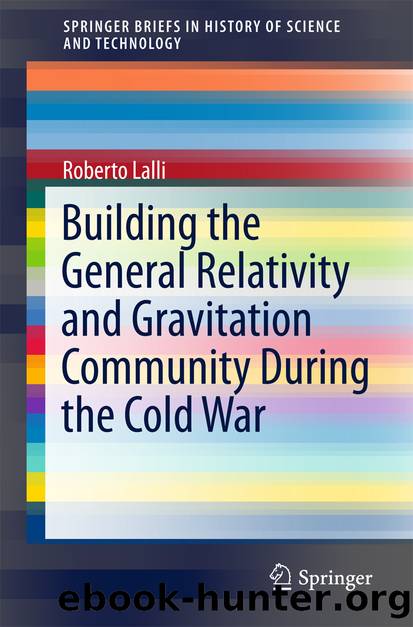Building the General Relativity and Gravitation Community During the Cold War by Roberto Lalli

Author:Roberto Lalli
Language: eng
Format: epub
Publisher: Springer International Publishing, Cham
This was a rather drastic step taken by a member of a formal international scientific organization who was expected to serve as a neutral secretary. Even more so as Mercierâs actions in the community-building activities had always been with the conscious aim of strengthening peaceful cooperation among nations. In this specific case, however, following his personal ethical and political beliefs, Mercier felt that he had the right and the duty to profoundly affect the future of the international community by promoting a political boycott of the meeting.
To make matters worse, Peres had still not received his invitation to the GR5, which made it practically impossible to plan his participation.29 Peres had already explicitly asked not to put the members of the Soviet organizing committee of the GR5 conference in âan embarrassing situationâ because they could ânot be held responsibleâ for this state of affairs, and urged Bondi ânot to let it escalate into an unpleasant incident.â30 Peresâs wishes could not be complied with. Since the only request made by the ICGRG had not been fulfilled, Bondi could do nothing but send a six-page-long telegram stating that given the inability of the Soviet colleagues to prevent political matters from affecting the organization of the scientific conference, the Soviet conference could not be considered a âtruly international conference,â but rather âa Soviet-organized conference to which numerous foreign scientists have been invited.â31 This meant that the Tbilisi conference would not have had the official sponsorship of the ICGRG. Bondi, as President of the committee, would not attend the meeting in order to avoid any ambiguity on this point. However, this decision to withdraw the official sponsorship of the conference, in Bondiâs view, should not have any implications on the participation of the individual scientists who had already planned to attend the Tbilisi conference. For Bondi, no âother political and non-scientific issue is a reason for such cancellation,â explicitly criticizing Mercierâs attempts to boycott the meeting in response to the armed invasion of Czechoslovakia.32
Many people did not follow Bondiâs recommendations and chose not to attend the conference. Most members of the ICGRG boycotted the meeting, deciding that in this particular situation their political views were more important than any attempts to save the ICGRG from potentially destructive tensions.33 The decision of various individuals to cancel their participation in the Tbilisi conference depended on different factors, but the Czech crisis played a particularly relevant role as a letter from Penrose to Bondi made clear: âit seemed to me that any act which appeared to condone the Russian invasion would be unthinkable.â34
There was deep confusion and uncertainty concerning the future of the GRG community. No document can show the feelings of delusion and confusion experienced by the scholars who had long been working on strengthening the GRG field and supporting its institutional representation through the ICGRG better than an unpublished document written by Bergmann in that period. In his attempt to summarize the situation, Bergmann lamented the complete lack of coordination: everything had happened so fast that there had been no way to prepare a coordinated response to the events.
Download
This site does not store any files on its server. We only index and link to content provided by other sites. Please contact the content providers to delete copyright contents if any and email us, we'll remove relevant links or contents immediately.
Barron's AP Biology by Goldberg M.S. Deborah T(3631)
Aliens by Jim Al-Khalili(2381)
MCAT Physics and Math Review 2019-2020 by Kaplan Test Prep(1444)
Cracking the AP Physics C Exam, 2018 Edition by Princeton Review(1402)
The Two Cultures by C. P. Snow(1034)
Biology For Dummies (For Dummies (Math & Science)) by Rene Fester Kratz(1029)
Biology For Dummies by Fester Kratz Rene(1025)
500 AP Chemistry Questions to Know by Test Day(992)
Cracking the AP Chemistry Exam, 2012 Edition by Princeton Review(991)
MCAT Organic Chemistry Review 2019-2020 by Kaplan Test Prep(982)
MCAT General Chemistry Review 2019-2020 by Kaplan Test Prep(940)
Cracking the AP Physics 2 Exam, 2018 Edition by Princeton Review(932)
Cracking the AP Chemistry Exam, 2018 Edition by Princeton Review(903)
Aliens: The World's Leading Scientists on the Search for Extraterrestrial Life by Jim Al-Khalili(874)
500 AP Chemistry Questions to Know by Test Day by Mina Lebitz(873)
Chemistry Essentials For Dummies by John T. Moore(828)
McGraw-Hill Education SAT Subject Test Biology by Stephanie Zinn(824)
Cracking the AP Environmental Science Exam, 2018 Edition by Princeton Review(806)
McGraw-Hill Education Preparation for the GED Test by McGraw-Hill Education Editors(780)
